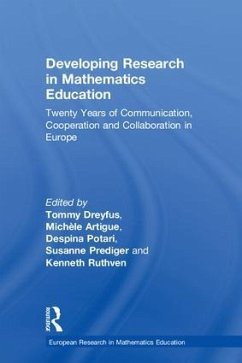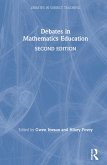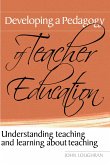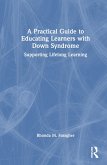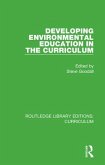Developing Research in Mathematics Education
Twenty Years of Communication, Cooperation and Collaboration in Europe
Herausgeber: Dreyfus, Tommy; Potari, Despina; Artigue, Michèle
Developing Research in Mathematics Education
Twenty Years of Communication, Cooperation and Collaboration in Europe
Herausgeber: Dreyfus, Tommy; Potari, Despina; Artigue, Michèle
- Gebundenes Buch
- Merkliste
- Auf die Merkliste
- Bewerten Bewerten
- Teilen
- Produkt teilen
- Produkterinnerung
- Produkterinnerung
This field-spanning book will set out the broad advances in knowledge which have accumulated in the 21st century through the sustained exchange of ideas and collaboration between mathematics education researchers, considering both european and global perspectives. It is split in to three main sections focusing on content domains and processes, aspects of mathematics teaching and learning, and linguistic and social perspectives, and concludes with two lively international discussion chapters. Each section will include coverage of recent developments, current status and future outlook of global…mehr
Andere Kunden interessierten sich auch für
![A Developing Discourse in Music Education A Developing Discourse in Music Education]() Keith SwanwickA Developing Discourse in Music Education177,99 €
Keith SwanwickA Developing Discourse in Music Education177,99 €![Debates in Mathematics Education Debates in Mathematics Education]() Debates in Mathematics Education168,99 €
Debates in Mathematics Education168,99 €![Mathematics in Early Years Education Mathematics in Early Years Education]() Ann Montague-SmithMathematics in Early Years Education198,99 €
Ann Montague-SmithMathematics in Early Years Education198,99 €![Post-Secondary Chemistry Education in Developing Countries Post-Secondary Chemistry Education in Developing Countries]() Dawn I. FoxPost-Secondary Chemistry Education in Developing Countries171,99 €
Dawn I. FoxPost-Secondary Chemistry Education in Developing Countries171,99 €![Developing a Pedagogy of Teacher Education Developing a Pedagogy of Teacher Education]() John LoughranDeveloping a Pedagogy of Teacher Education177,99 €
John LoughranDeveloping a Pedagogy of Teacher Education177,99 €![A Practical Guide to Educating Learners with Down Syndrome A Practical Guide to Educating Learners with Down Syndrome]() Rhonda M. FaragherA Practical Guide to Educating Learners with Down Syndrome149,99 €
Rhonda M. FaragherA Practical Guide to Educating Learners with Down Syndrome149,99 €![Developing Environmental Education in the Curriculum Developing Environmental Education in the Curriculum]() Developing Environmental Education in the Curriculum130,99 €
Developing Environmental Education in the Curriculum130,99 €-
-
-
This field-spanning book will set out the broad advances in knowledge which have accumulated in the 21st century through the sustained exchange of ideas and collaboration between mathematics education researchers, considering both european and global perspectives. It is split in to three main sections focusing on content domains and processes, aspects of mathematics teaching and learning, and linguistic and social perspectives, and concludes with two lively international discussion chapters. Each section will include coverage of recent developments, current status and future outlook of global research making this book a fascintaing compendium of state of the art mathematical knowledge.
Produktdetails
- Produktdetails
- Verlag: Routledge
- Seitenzahl: 314
- Erscheinungstermin: 24. April 2018
- Englisch
- Abmessung: 240mm x 161mm x 21mm
- Gewicht: 637g
- ISBN-13: 9781138080270
- ISBN-10: 1138080276
- Artikelnr.: 52528367
- Herstellerkennzeichnung
- Libri GmbH
- Europaallee 1
- 36244 Bad Hersfeld
- gpsr@libri.de
- Verlag: Routledge
- Seitenzahl: 314
- Erscheinungstermin: 24. April 2018
- Englisch
- Abmessung: 240mm x 161mm x 21mm
- Gewicht: 637g
- ISBN-13: 9781138080270
- ISBN-10: 1138080276
- Artikelnr.: 52528367
- Herstellerkennzeichnung
- Libri GmbH
- Europaallee 1
- 36244 Bad Hersfeld
- gpsr@libri.de
Tommy Dreyfus is Emeritus Professor of Mathematics Education at Tel Aviv University in Israel and one of the Founding Series Editors of the IMPACT Mathematics series. He is an Advisory Editor of Educational Studies in Mathematics and a Contributing Editor of the Journal of Mathematical Behavior. He has previously edited several books including one in Routledge's EARLI book series. Michèle Artigue is Emeritus Professor of Mathematics Education at the University Paris Diderot - Paris 7 in France. She was recently awarded the Felix Klein medal for life-time achievement in mathematics education research by the International Commission on Mathematical Instruction, and is a Knight of the French National Order of the Legion of Honour. Despina Potari is Professor of Mathematics Education at the University of Athens in Greece, and Guest Professor of Mathematics Education at Linnaeus University in Sweden. She is also Editor-in-Chief of the Journal of Mathematics Teacher Education. Susanne Prediger is Professor of Mathematics Education and head of the Institute for Development and Research in Mathematics Education at the University of Dortmund in Germany. She has authored numerous journal articles and book chapters and is currently President of ERME, the European Society for Research in Mathematics Education. Kenneth Ruthven is Emeritus Professor of Education at the University of Cambridge in England and Guest Professor in Mathematics Education at Karlstad University in Sweden and at the University of Agder in Norway. He is an Advisory Editor of the international journals Educational Studies in Math-ematics and Research in Mathematics Education and a Fellow of the Academy of Social Sciences.
Foreword Preface The European Society for Research in Mathematics Education: Introduction by its former presidents Ferdinando Arzarello
Paolo Boero
Viviane Durand-Guerrier and Barbara Jaworski Chapter 1. From geometrical thinking to geometrical working competencies Alain Kuzniak
Philippe R. Richard
Paraskevi Michael-Chrysanthou Chapter 2. Number sense in teaching and learning arithmetic Sebastian Rezat
Lisser Rye Ejersbo Chapter 3. Algebraic thinking Jeremy Hodgen
Reinhard Oldenburg
Heidi Strømskag Chapter 4. Research on probability and statistics education: trends and directions Arthur Bakker
Corinne Hahn
Sibel Kazak
Dave Pratt Chapter 5. Research on university mathematics education Carl Winsløw
Ghislaine Gueudet
Reinhard Hochmuth
Elena Nardi Chapter 6. Argumentation and proof M. Alessandra Mariotti
Viviane Durand-Guerrier
Gabriel J. Stylianides Chapter 7. Theory-practice relations in research on applications and modelling Morten Blomhøj
Jonas Bergman Ärlebäck Chapter 8. Early years mathematics Esther S. Levenson
Maria G. Bartolini Bussi
Ingvald Erfjord Chapter 9. Mathematical potential
creativity and talent Demetra Pitta-Pantazi
Roza Leikin Chapter 10. Affect and mathematical thinking: Exploring developments
trends
and future directions Markku S. Hannula
Marilena Pantziara
Pietro Di Martino Chapter 11. Technology and resources in mathematics education Jana Trgalová
Alison Clark-Wilson
Hans-Georg Weigand Chapter 12. Classroom practice and teachers' knowledge
beliefs
and identity Jeppe Skott
Reidar Mosvold
Charalampos Sakonidis Chapter 13. Mathematics teacher education and professional development Alena Hopesová
José Carrillo
Leonor Santos Chapter 14. Mathematics education and language: Lessons and directions from two decades of research Núria Planas
Candia Morgan
Marcus Schütte Chapter 15. Diversity in mathematics education Guida de Abreu
Núria Gorgorió
Lisa Björklund Boistrup Chapter 16. Comparative studies in mathematics education Eva Jablonka
Paul Andrews
David Clarke
Constantinos Xenofontos Chapter 17. History and mathematics education Uffe Thomas Jankvist
Jan van Maanen Chapter 18. Theoretical perspectives and approaches in mathematics education research Ivy Kidron
Marianna Bosch
John Monaghan
Hanna Palmér Chapter 19. ERME as a Group: Questions to mould its identity Marcelo C. Borba Chapter 20. Communication
cooperation
and collaboration: ERME's magnificent experiment Norma Presmeg
Paolo Boero
Viviane Durand-Guerrier and Barbara Jaworski Chapter 1. From geometrical thinking to geometrical working competencies Alain Kuzniak
Philippe R. Richard
Paraskevi Michael-Chrysanthou Chapter 2. Number sense in teaching and learning arithmetic Sebastian Rezat
Lisser Rye Ejersbo Chapter 3. Algebraic thinking Jeremy Hodgen
Reinhard Oldenburg
Heidi Strømskag Chapter 4. Research on probability and statistics education: trends and directions Arthur Bakker
Corinne Hahn
Sibel Kazak
Dave Pratt Chapter 5. Research on university mathematics education Carl Winsløw
Ghislaine Gueudet
Reinhard Hochmuth
Elena Nardi Chapter 6. Argumentation and proof M. Alessandra Mariotti
Viviane Durand-Guerrier
Gabriel J. Stylianides Chapter 7. Theory-practice relations in research on applications and modelling Morten Blomhøj
Jonas Bergman Ärlebäck Chapter 8. Early years mathematics Esther S. Levenson
Maria G. Bartolini Bussi
Ingvald Erfjord Chapter 9. Mathematical potential
creativity and talent Demetra Pitta-Pantazi
Roza Leikin Chapter 10. Affect and mathematical thinking: Exploring developments
trends
and future directions Markku S. Hannula
Marilena Pantziara
Pietro Di Martino Chapter 11. Technology and resources in mathematics education Jana Trgalová
Alison Clark-Wilson
Hans-Georg Weigand Chapter 12. Classroom practice and teachers' knowledge
beliefs
and identity Jeppe Skott
Reidar Mosvold
Charalampos Sakonidis Chapter 13. Mathematics teacher education and professional development Alena Hopesová
José Carrillo
Leonor Santos Chapter 14. Mathematics education and language: Lessons and directions from two decades of research Núria Planas
Candia Morgan
Marcus Schütte Chapter 15. Diversity in mathematics education Guida de Abreu
Núria Gorgorió
Lisa Björklund Boistrup Chapter 16. Comparative studies in mathematics education Eva Jablonka
Paul Andrews
David Clarke
Constantinos Xenofontos Chapter 17. History and mathematics education Uffe Thomas Jankvist
Jan van Maanen Chapter 18. Theoretical perspectives and approaches in mathematics education research Ivy Kidron
Marianna Bosch
John Monaghan
Hanna Palmér Chapter 19. ERME as a Group: Questions to mould its identity Marcelo C. Borba Chapter 20. Communication
cooperation
and collaboration: ERME's magnificent experiment Norma Presmeg
Foreword Preface The European Society for Research in Mathematics Education: Introduction by its former presidents Ferdinando Arzarello
Paolo Boero
Viviane Durand-Guerrier and Barbara Jaworski Chapter 1. From geometrical thinking to geometrical working competencies Alain Kuzniak
Philippe R. Richard
Paraskevi Michael-Chrysanthou Chapter 2. Number sense in teaching and learning arithmetic Sebastian Rezat
Lisser Rye Ejersbo Chapter 3. Algebraic thinking Jeremy Hodgen
Reinhard Oldenburg
Heidi Strømskag Chapter 4. Research on probability and statistics education: trends and directions Arthur Bakker
Corinne Hahn
Sibel Kazak
Dave Pratt Chapter 5. Research on university mathematics education Carl Winsløw
Ghislaine Gueudet
Reinhard Hochmuth
Elena Nardi Chapter 6. Argumentation and proof M. Alessandra Mariotti
Viviane Durand-Guerrier
Gabriel J. Stylianides Chapter 7. Theory-practice relations in research on applications and modelling Morten Blomhøj
Jonas Bergman Ärlebäck Chapter 8. Early years mathematics Esther S. Levenson
Maria G. Bartolini Bussi
Ingvald Erfjord Chapter 9. Mathematical potential
creativity and talent Demetra Pitta-Pantazi
Roza Leikin Chapter 10. Affect and mathematical thinking: Exploring developments
trends
and future directions Markku S. Hannula
Marilena Pantziara
Pietro Di Martino Chapter 11. Technology and resources in mathematics education Jana Trgalová
Alison Clark-Wilson
Hans-Georg Weigand Chapter 12. Classroom practice and teachers' knowledge
beliefs
and identity Jeppe Skott
Reidar Mosvold
Charalampos Sakonidis Chapter 13. Mathematics teacher education and professional development Alena Hopesová
José Carrillo
Leonor Santos Chapter 14. Mathematics education and language: Lessons and directions from two decades of research Núria Planas
Candia Morgan
Marcus Schütte Chapter 15. Diversity in mathematics education Guida de Abreu
Núria Gorgorió
Lisa Björklund Boistrup Chapter 16. Comparative studies in mathematics education Eva Jablonka
Paul Andrews
David Clarke
Constantinos Xenofontos Chapter 17. History and mathematics education Uffe Thomas Jankvist
Jan van Maanen Chapter 18. Theoretical perspectives and approaches in mathematics education research Ivy Kidron
Marianna Bosch
John Monaghan
Hanna Palmér Chapter 19. ERME as a Group: Questions to mould its identity Marcelo C. Borba Chapter 20. Communication
cooperation
and collaboration: ERME's magnificent experiment Norma Presmeg
Paolo Boero
Viviane Durand-Guerrier and Barbara Jaworski Chapter 1. From geometrical thinking to geometrical working competencies Alain Kuzniak
Philippe R. Richard
Paraskevi Michael-Chrysanthou Chapter 2. Number sense in teaching and learning arithmetic Sebastian Rezat
Lisser Rye Ejersbo Chapter 3. Algebraic thinking Jeremy Hodgen
Reinhard Oldenburg
Heidi Strømskag Chapter 4. Research on probability and statistics education: trends and directions Arthur Bakker
Corinne Hahn
Sibel Kazak
Dave Pratt Chapter 5. Research on university mathematics education Carl Winsløw
Ghislaine Gueudet
Reinhard Hochmuth
Elena Nardi Chapter 6. Argumentation and proof M. Alessandra Mariotti
Viviane Durand-Guerrier
Gabriel J. Stylianides Chapter 7. Theory-practice relations in research on applications and modelling Morten Blomhøj
Jonas Bergman Ärlebäck Chapter 8. Early years mathematics Esther S. Levenson
Maria G. Bartolini Bussi
Ingvald Erfjord Chapter 9. Mathematical potential
creativity and talent Demetra Pitta-Pantazi
Roza Leikin Chapter 10. Affect and mathematical thinking: Exploring developments
trends
and future directions Markku S. Hannula
Marilena Pantziara
Pietro Di Martino Chapter 11. Technology and resources in mathematics education Jana Trgalová
Alison Clark-Wilson
Hans-Georg Weigand Chapter 12. Classroom practice and teachers' knowledge
beliefs
and identity Jeppe Skott
Reidar Mosvold
Charalampos Sakonidis Chapter 13. Mathematics teacher education and professional development Alena Hopesová
José Carrillo
Leonor Santos Chapter 14. Mathematics education and language: Lessons and directions from two decades of research Núria Planas
Candia Morgan
Marcus Schütte Chapter 15. Diversity in mathematics education Guida de Abreu
Núria Gorgorió
Lisa Björklund Boistrup Chapter 16. Comparative studies in mathematics education Eva Jablonka
Paul Andrews
David Clarke
Constantinos Xenofontos Chapter 17. History and mathematics education Uffe Thomas Jankvist
Jan van Maanen Chapter 18. Theoretical perspectives and approaches in mathematics education research Ivy Kidron
Marianna Bosch
John Monaghan
Hanna Palmér Chapter 19. ERME as a Group: Questions to mould its identity Marcelo C. Borba Chapter 20. Communication
cooperation
and collaboration: ERME's magnificent experiment Norma Presmeg

